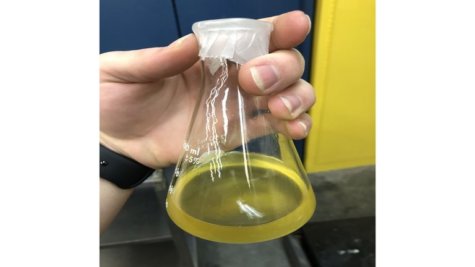
WASHINGTON — Plastic bags and gasoline are two products that environmental advocates often lobby the public to stop using for the good of the planet. Now, scientists say there’s a way to turn plastic bags into a more sustainable source of fuel.
Researchers from California State Polytechnic University have created a process that chemically breaks down plastic waste into a diesel-like substance.
Estimates show that humans produce around 300 million tons of plastic waste each year. Making matters worse, plastic’s life cycle makes it difficult to remove these products from the planet once they enter landfills. Ultimately, a large amount of these plastics break down into microplastics that enter the ocean and other ecosystems.
From there, fish and other animals consume these particles which impact their own health and can even disrupt human health when people eat seafood and other products.
The ‘catalyst’ for eco-friendly gas?

Study authors used catalytic pyrolysis to turn plastic bags into this new fuel source. Scientists define pyrolysis as the “thermochemical decomposition of carbon-based matter in the absence of oxygen.”
The team took the recycled plastic and converted into a vapor using extreme heat. Combining that with a chemical catalyst then turned it into a fuel-like substance.
“The innovative part of the experiment is the catalyst,” study author Mingheng Li explains in a media release. “The catalyst is critical to this particular pyrolysis process, because it only requires one step to get to the desired fuel product at relatively mild temperatures.”
Scientists created their catalyst by dipping a zeolite substrate (a mineral) in a solution of nickel and tungsten. The team then dried the substance in an oven at over 900 degrees Fahrenheit. They used this catalyst in combination with a single-stage pyrolytic reactor that runs at nearly 700 degrees to break down the everyday plastic grocery bags.
Researchers believe this fuel-making process would work with other waste products like manure, used engine oil, and other waste products.
“This pyrolysis process serves as a definitive step in reducing reliance on fossil-based fuels,” Li says.
The team says the final product resembles regular diesel fuel. Moving forward, scientists will try to optimize their plastic conversion methods to make diesel fuel from this seemingly never-ending source of pollution.
The study is published in the Journal of Renewable and Sustainable Energy.

“The team took the recycled plastic and converted into a vapor using extreme heat.”
Which required an energy source. What was that source and how much energy was used to produce this new fuel versus how much energy that fuel will produce?
Please stop writing for 5 year-olds.